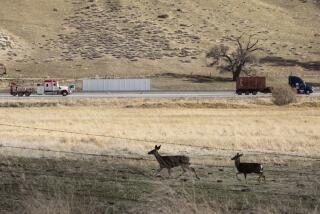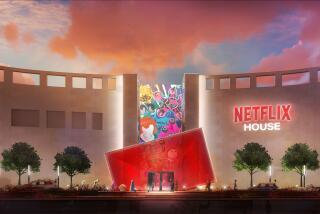Ford to Buy Up Dealerships in Test Program
- Share via
DETROIT — In the most radical move yet by an auto maker to shake up its dealer network, Ford Motor Co. said Friday that it plans to buy up dealerships in Indianapolis and two other cities and replace them with auto superstores and satellite service centers.
The company this week approached dealers in Indianapolis with a plan to acquire the region’s 18 independent Ford and Lincoln-Mercury dealerships. They would be replaced by four or five new mega-dealerships.
Remaking the Indianapolis dealer network alone could cost Ford $155 million, dealers said. Ford, the nation’s No. 2 auto maker, said Friday that it’s also considering similar tests in two other medium-sized cities, which it declined to identify.
The experiment comes as Ford and other major auto makers are struggling to reduce their dealership ranks while combating an onslaught of publicly owned auto superstore retailers. Other auto makers are testing retail innovations, but none as far-reaching as the Ford initiative.
“This is Ford’s wake-up call to its dealers telling them that the world of auto retailing is changing,” said Donald Keithley, auto retail analyst and partner at J.D. Power & Associates.
Ford spokesman John Ochs said the Indianapolis program is voluntary and would only go forward if enough dealers agree to participate. The program would begin this year, but it could take two to three years to complete.
The company proposes a partnership with dealers to acquire the independent franchises. Dealers could either sell their franchises or take equity stakes in the new venture. Ford would then build four or five mega-dealerships that would be operated by the dealer-partners with the best customer satisfaction records.
Dealers said they are surprised by the Ford initiative and will take a hard look at it.
“The anxiety level around Indianapolis is off the charts,” Jerry Harvey, president of Paul Harvey Ford, told the Indianapolis Star.
Ford said each of its superstores would have major service operations. But to ensure proximity to customers, they would be complemented by a half-dozen satellite service centers near residential and business districts.
Ochs described the program as a “learning laboratory” for the company to test new sales processes, such as no-haggle selling, use of a salaried sales force and large car and truck offerings.
“The processes we find successful we will cascade through the Ford and Lincoln-Mercury network in coming years,” Ochs said.
Such techniques already are appearing in auto superstores popping up nationwide, such as Circuit City’s CarMax and Republic Industries’ AutoNation USA. In the last six months, Republic--headed by entrepreneur H. Wayne Huizenga--has become the nation’s largest new-car dealer by acquiring more than 100 franchises with $5 billion in annual sales.
Ford, in a surprise move in December, signed an agreement that permits Republic to acquire its dealerships. The auto maker had long opposed ownership of dealerships by publicly owned companies, but was drawn to Republic because of Huizenga’s high customer satisfaction record in his previous video rental and waste management ventures.
Several other auto makers are resisting Huizenga’s advances. Both Honda and Toyota have gone to court to restrict Republic’s acquisitions of their dealerships.
Ford, Chrysler and General Motors have been more open to Republic and CarMax. The Big Three hope the superstore operators will aid their consolidation efforts while bringing more customer-friendly practices to their showrooms.
There are about 5,100 Ford and Lincoln-Mercury dealerships nationwide, and Ford executives have made no secret of their desire to trim the number considerably. Consolidation would reduce distribution costs and curb competition among Ford dealers for the same customers.
“We would like to have Ford dealers competing against other brands and not each other,” Ochs said.






